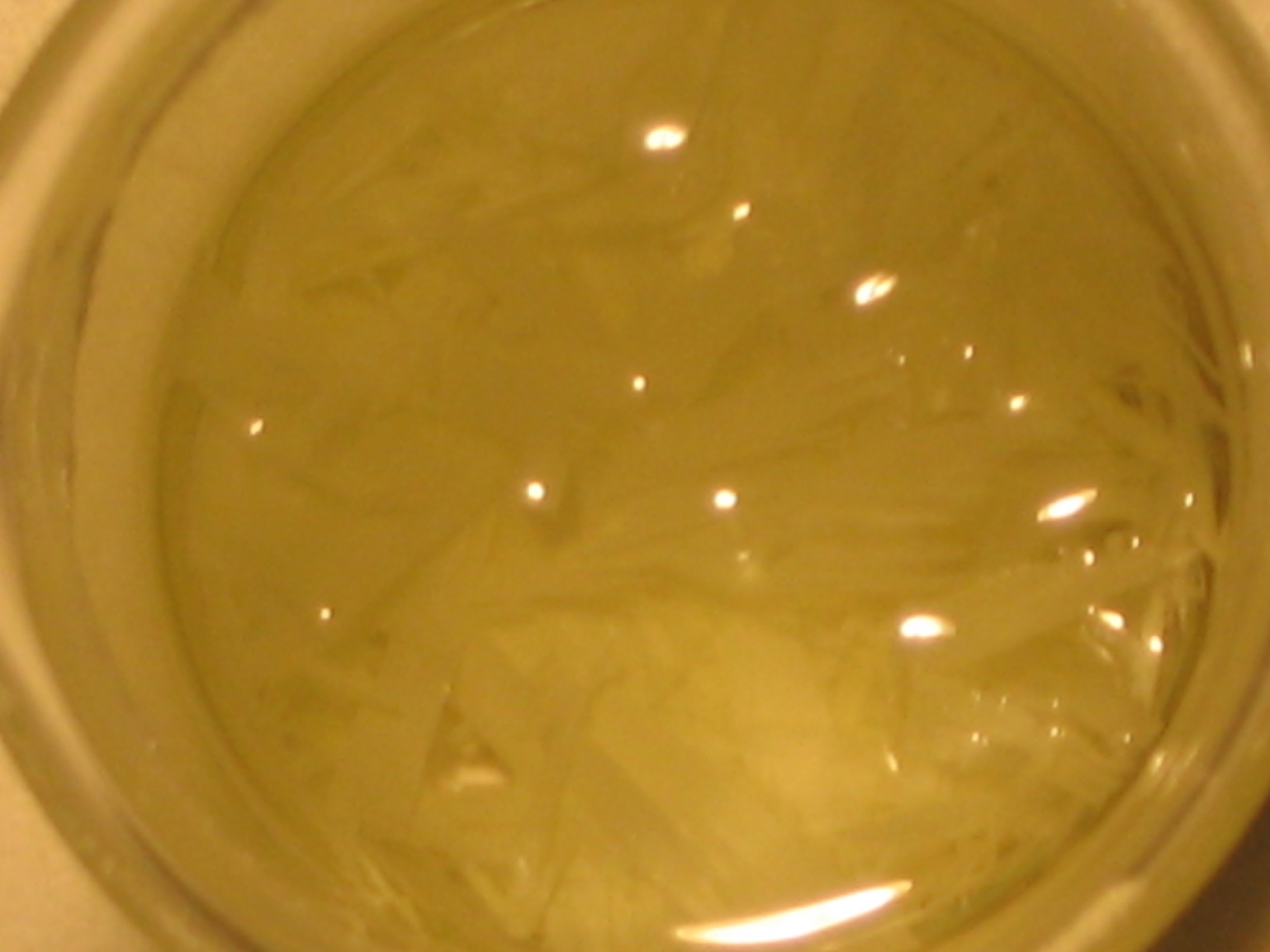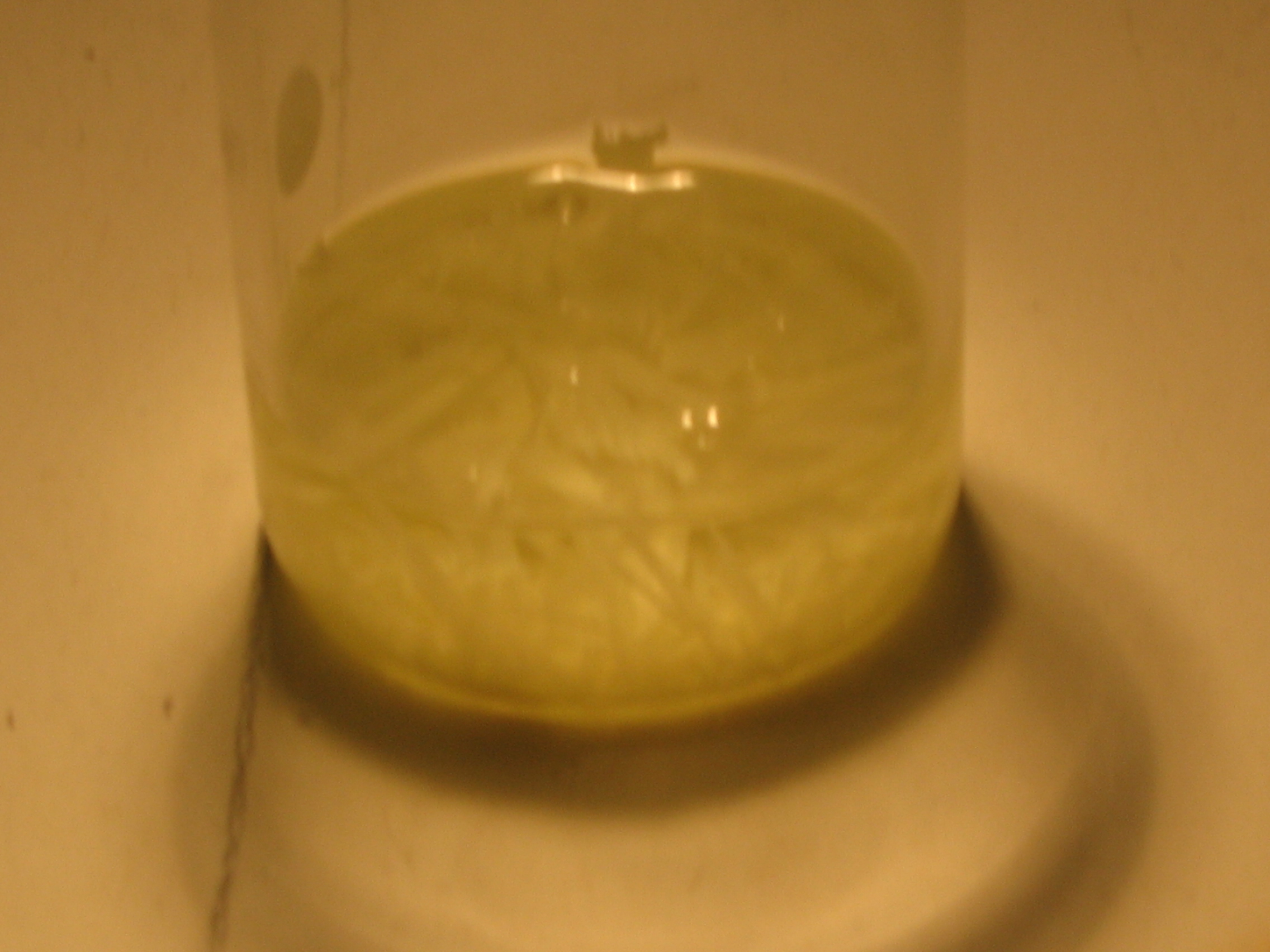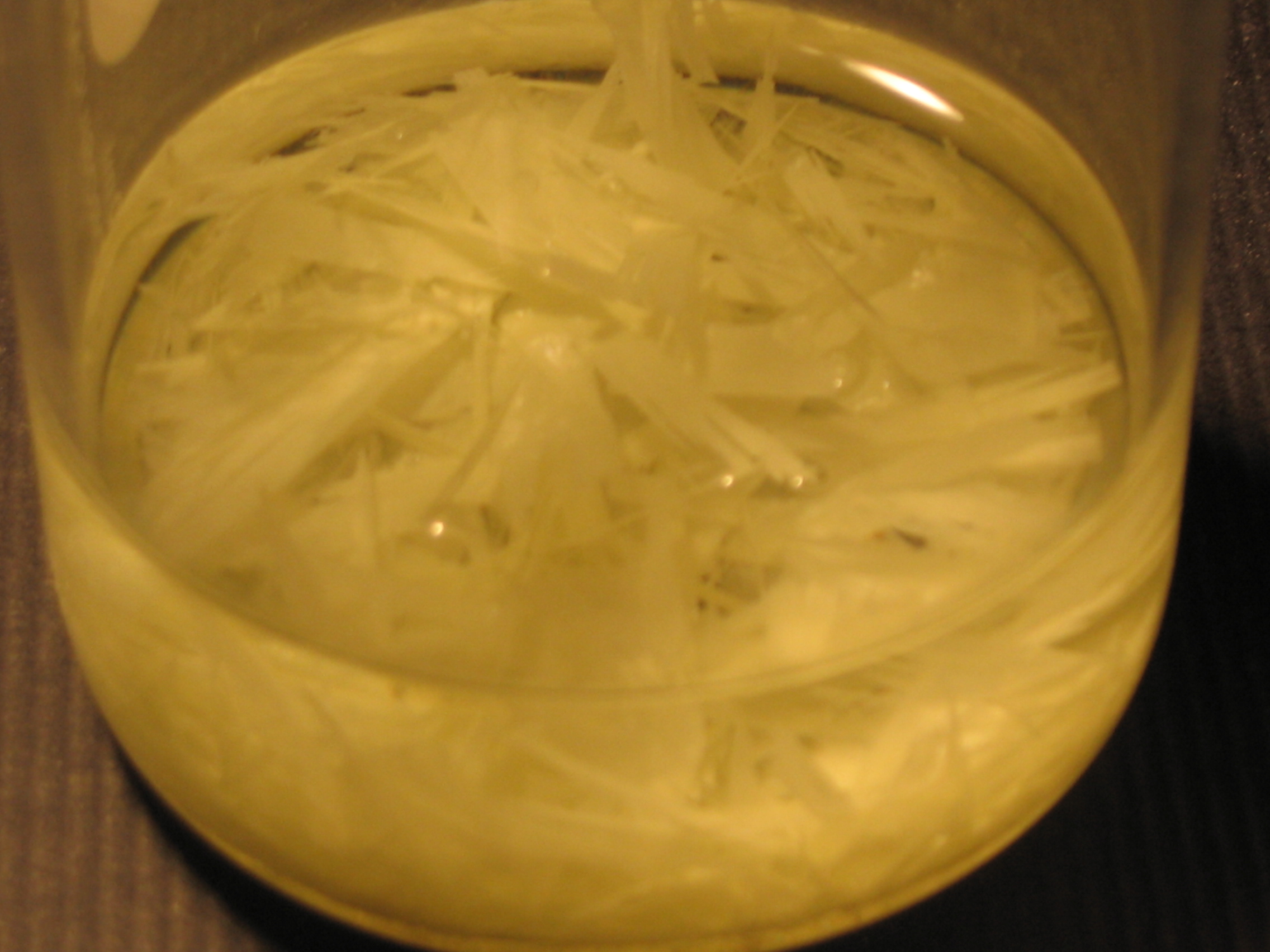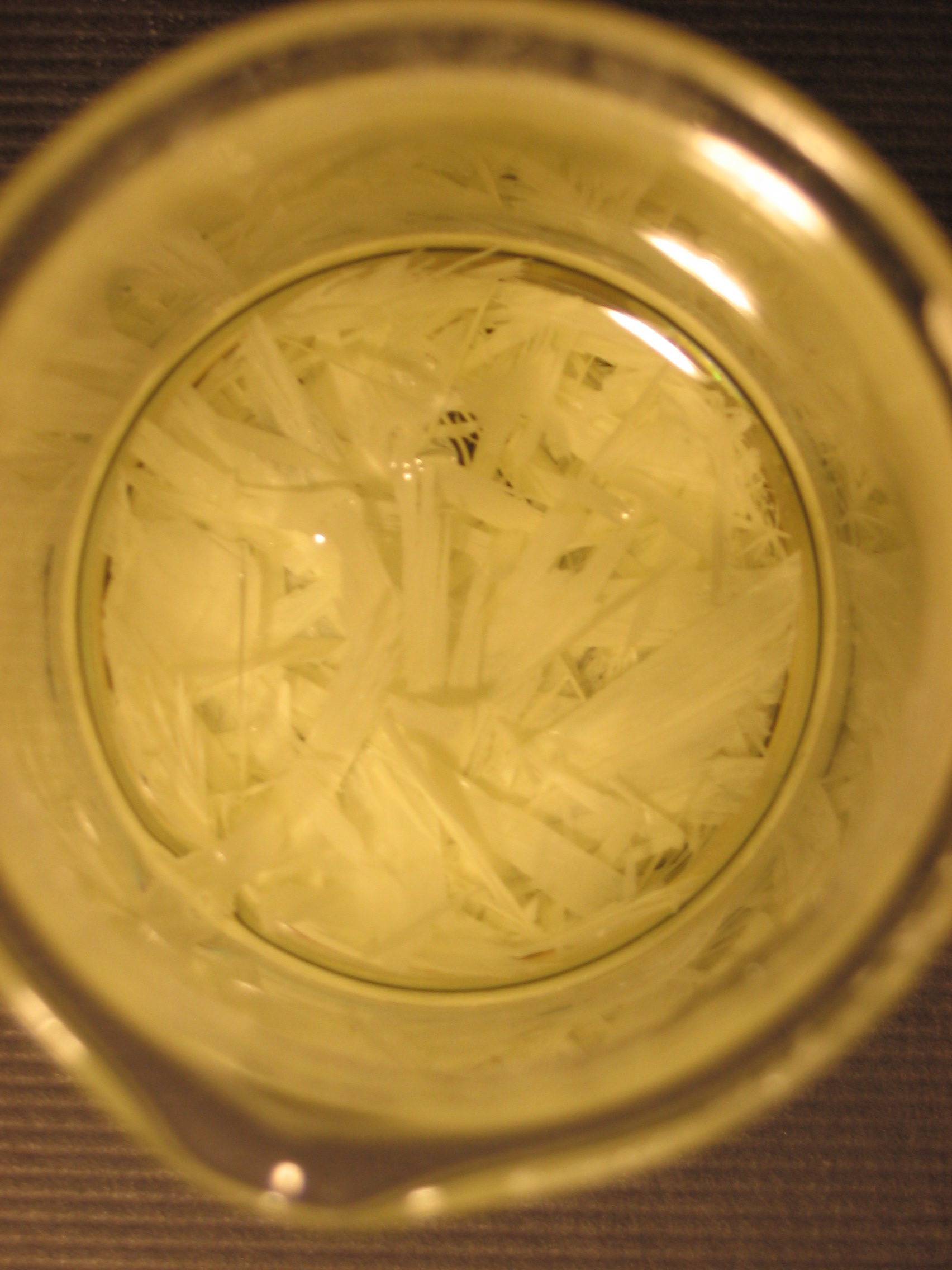| Pages:
1
2 |
garage chemist
chemical wizard
    
Posts: 1803
Registered: 16-8-2004
Location: Germany
Member Is Offline
Mood: No Mood
|
|
Hot toluene: a great solvent for sulfur
I just looked after my batch of vermilion from a few months ago and scratched the sublimated mercury sulfide from the walls of the test tube. I was
wondering how to get the excess of sulfur out of it. NaOH came to mind, but the resulting polysulfide solution would dissolve the HgS to form the
nasty sulfide complex. Carbon disulfide was not available.
I remembered that sulfur has limited solubility in toluene, and I made a quick experiment to find out how big it was.
I poured 10ml toluene into a small beaker , put in a stirring bar and added sulfur while stirring.
I was able to dissolve quite a bit of sulfur, I estimated it to be around 0,2g.
Then I heated it to see if the solubility would increase, and what do you think, when I added more sulfur, it dissolved as fast as salt in water!
About 2g could be dissolved, and the toluene was not even close to boiling. Upon cooling, beautiful yellow transparent sulfur crystals separated out.
(The weight statements are only estimations, I didn't weigh the sulfur)
So if anyone needs to purify the 90% "dusting sulfur" from the garden store (contains CaCO3 as an impurity), hot toluene is the perfect
solvent for this task.
Or does someone have a distillation apparatus with sulfur on the inside walls from an attempt to make CS2 or S2Cl2?
I wonder if the solubility of white phosphorus also increases that much with temperature... I have some WP, I could try it out. But this would require
strict measurements to exclude oxygen, as the hot solution would ignite in air without a doubt.
|
|
|
neutrino
International Hazard
    
Posts: 1583
Registered: 20-8-2004
Location: USA
Member Is Offline
Mood: oscillating
|
|
That's very interesting, garage chemist. Thank you for sharing.
|
|
|
chemoleo
Biochemicus Energeticus
    
Posts: 3005
Registered: 23-7-2003
Location: England Germany
Member Is Offline
Mood: crystalline
|
|
Very interesting! I always wanted to grow large single sulphur crystals!
Could you post a couple of pics, if you have a digicam?
Never Stop to Begin, and Never Begin to Stop...
Tolerance is good. But not with the intolerant! (Wilhelm Busch)
|
|
|
garage chemist
chemical wizard
    
Posts: 1803
Registered: 16-8-2004
Location: Germany
Member Is Offline
Mood: No Mood
|
|
The sulfur has formed two different crystal shapes: some small compact, deep yellow aggregates and some extremely thin crystal leafs which are almost
colorless because they are just so thin. With slower cooling, one should be able to grow larger compact crystals when appropriate seed crystals are
used.
I have a digicam, I'll make some pictures today or tomorrow.
|
|
|
Rosco Bodine
Banned
Posts: 6370
Registered: 29-9-2004
Member Is Offline
Mood: analytical
|
|
Could be a good method for distributing finely divided precipitated sulfur in AN , as a sensitizer . It might be a way of bringing the Sulfur and
powdered charcoal into intimate contact , for black powder manufacture , or for similar uses
where the charcoal and sulfur binary fuel
may find usefulness . Urea might be component of interest having possible
reactivity with the sulfur in toluene solution . Paraffin is another potential
reactant in such a mixture .
|
|
|
garage chemist
chemical wizard
    
Posts: 1803
Registered: 16-8-2004
Location: Germany
Member Is Offline
Mood: No Mood
|
|
Pics!
From above

|
|
|
garage chemist
chemical wizard
    
Posts: 1803
Registered: 16-8-2004
Location: Germany
Member Is Offline
Mood: No Mood
|
|
From the side

|
|
|
garage chemist
chemical wizard
    
Posts: 1803
Registered: 16-8-2004
Location: Germany
Member Is Offline
Mood: No Mood
|
|
With black background, from the side

|
|
|
garage chemist
chemical wizard
    
Posts: 1803
Registered: 16-8-2004
Location: Germany
Member Is Offline
Mood: No Mood
|
|
With black background, from above (best picture of the four)
The crystals are all the same shape now, and have the same thickness. It looked very different when it wasn't fully cooled.
I'll try out what happens when I cool it very slowly. Maybe I can get some large sulfur crystals.
[Edited on 14-5-2005 by garage chemist]

|
|
|
Natures Natrium
Hazard to Others
  
Posts: 163
Registered: 22-12-2004
Member Is Offline
Mood: No Mood
|
|
Wow, very interesting. Thank you garage chemist, for sharing! 
Nature's Natrium
\"The man who does not read good books has no advantage over the man who cannot read them.\" - Mark Twain (1835-1910)
|
|
|
Esplosivo
Hazard to Others
  
Posts: 491
Registered: 7-2-2004
Location: Mediterranean
Member Is Offline
Mood: Quantized
|
|
If cooled slowly a saturated sulfur soln in toluene can lead to quite large rhombic sulfur crystals. We did that once at school, and I have repeated
the experiment (for the fun of it) a couple of times at home. Surely less dangerous than carbon disulfide.
Edit: Those crystals seem more like monoclinic in this case. Strange. Did you cool the toluene quickly from a temperature of above 95.6 deg C?
[Edited on 15-5-2005 by Esplosivo]
Theory guides, experiment decides.
|
|
|
Rosco Bodine
Banned
Posts: 6370
Registered: 29-9-2004
Member Is Offline
Mood: analytical
|
|
I keep wondering if possibly refluxing some urea and sulfur in toluene might not produce ammonium thiocyanate .
|
|
|
garage chemist
chemical wizard
    
Posts: 1803
Registered: 16-8-2004
Location: Germany
Member Is Offline
Mood: No Mood
|
|
I repeated the experiment with exactly 2g sulfur and 10ml toluene, and it dissolved without problems (it took some time though, and the toluene needed
to be boiling hot).
I observed an interesting phenomenon: the last part of the sulfur (about 0,5g) liquefied as a yellow blob under the toluene before going into
solution. I think that the toluene lowered the melting point of the sulfur, and that the sulfur molecules (S8-rings) needed to be seperated from each
other by the toluene molecules before they could dissolve.
And I always got monoclinic crystals, even with slow cooling. The toluene was over 100°C, though.
I also tested the solubility of sulfur in xylene (easier available) but it began boiling at about 80°C! It was a solvent from the hardware store
which said "contains xylene (mixture of isomers)" on its backside.
However, xylene is certainly not the only constituent of this solvent. I stopped this experiment.
[Edited on 15-5-2005 by garage chemist]
|
|
|
frogfot
Hazard to Others
  
Posts: 212
Registered: 30-11-2002
Location: Sweden
Member Is Offline
Mood: happy
|
|
GC, I just tested the solubility of S in xylene (mix of isomers) too. 10 ml dissolved 4 g S while solvent didn't reach boiling.
On cooling, some of the S precipitated out as liquid (solidified on cooling).. and rest as crystalls.
|
|
|
chloric1
International Hazard
    
Posts: 1162
Registered: 8-10-2003
Location: GroupVII of the periodic table
Member Is Offline
Mood: Stoichiometrically Balanced
|
|
Thats great too!
I have spending the last month purifying garden chems. The most easy is ammonium sulfate. Start with brown crystals and end up with white needles.
The stump remover I buy yields pure saltpeter after filtration. The toughest one to purify now is Copperas. I need to add sulfuric acd and it is very
soluble. But I get an excellent product. Later may skip the tedious seperation of the pure sulfate and just add a saturated ammonium sulfate solution
to get the ferrous ammonium sulfate. This is less soluble at freezing temperatures and it does not oxidize so easy.
Fellow molecular manipulator
|
|
|
jimwig
Hazard to Others
  
Posts: 215
Registered: 17-5-2003
Location: the sunny south
Member Is Offline
Mood: No Mood
|
|
Please elaborate on the copperas purification.
Trying to get purified ferous sulfate and as you said the starting material is dog turd brown prills.
[Edited on 17-8-2005 by jimwig]
|
|
|
12AX7
Post Harlot
    
Posts: 4803
Registered: 8-3-2005
Location: oscillating
Member Is Offline
Mood: informative
|
|
Speaking of copperas, the stuff I made (from acid + steel) doesn't want to oxidize much at all, it's very stable in air. (As such,
I've been growing crystals of it for storage.) Iron bisulfate maybe? The solution doesn't devour any more metal...
Tim
|
|
|
vulture
Forum Gatekeeper
    
Posts: 3330
Registered: 25-5-2002
Location: France
Member Is Offline
Mood: No Mood
|
|
Let's not get totally offtopic here...
One shouldn't accept or resort to the mutilation of science to appease the mentally impaired.
|
|
|
chloric1
International Hazard
    
Posts: 1162
Registered: 8-10-2003
Location: GroupVII of the periodic table
Member Is Offline
Mood: Stoichiometrically Balanced
|
|
OK then, I will just say that I am quite eager to try both xylene and toluene to dissolve sulfur. If anything to get those cool yellow crystals.
For those who wish to further discuss copperas join me here.
http://www.sciencemadness.org/talk/viewthread.php?tid=2616
Fellow molecular manipulator
|
|
|
MadHatter
International Hazard
    
Posts: 1352
Registered: 9-7-2004
Location: Maine
Member Is Offline
Mood: Enjoying retirement
|
|
Xylene
The xylene dissolves a higher weight and is more readily available. Thanks again for sharing !
From opening of NCIS New Orleans - It goes a BOOM ! BOOM ! BOOM ! MUHAHAHAHAHAHAHA !
|
|
|
woelen
Super Administrator
        
Posts: 8087
Registered: 20-8-2005
Location: Netherlands
Member Is Offline
Mood: interested
|
|
I tried the toluene method on a small scale and it works great. Thanks for that info!
I intend to repeat the experiment at a larger scale in order to get more and larger crystals of sulphur. I made pictures of the process. Have a look
at this place:
http://woelen.homescience.net/science/chem/exps/S+toluene/in...
EDIT(woelen): Changed the link, so that it works again.
[Edited on 24-6-13 by woelen]
|
|
|
naome
Harmless

Posts: 5
Registered: 29-8-2005
Member Is Offline
Mood: No Mood
|
|
the merck index says an aqueous sol. of
sodium sulfite dissolves sulfur.
prolly reacts with it so not so good for crystals, but might be just the thing for cleaning messy flasks!
|
|
|
woelen
Super Administrator
        
Posts: 8087
Registered: 20-8-2005
Location: Netherlands
Member Is Offline
Mood: interested
|
|
This indeed is a chemical reaction: sulfite reacts with sulphur to form thiosulfate:
SO3(2-) + S ---> S2O3(2-)
When it comes to cleaning sulphur from glasswork, then one can also use conc. NaOH solution, but of course, one has to be careful not to spoil the
glasswork with too much alkali for too much time.
Yet another easy solvent for sulphur is a solution of sulfide, which gives polysulfides.
However, all of these are not simple solutions, they are chemical reactions. The toluene stuff is really neat, because it gives a real solution, from
which the sulphur can be recovered in a nice crystalline form.
|
|
|
Hegi
Hazard to Others
  
Posts: 199
Registered: 27-9-2013
Member Is Offline
Mood: No idea.
|
|
Sulphur recrystallization from toluene
Hi guys... I´ve found 1 kilogram of 99% powdered sulphur at home so... I used boiling toluene for recrystallization - nice rhombic crystals up to 3
mm long were formed overnight.
<img src="http://chem.pieceofscience.com/wp-content/uploads/2015/08/sira1.jpg" alt="sulphur" style="width:900px;height:600px;">
<img src="http://chem.pieceofscience.com/wp-content/uploads/2015/08/sira2.jpg" alt="sulphur" style="width:900px;height:600px;">
<img src="http://chem.pieceofscience.com/wp-content/uploads/2015/08/sira3.jpg" alt="sulphur" style="width:900px;height:600px;">
Our webpage has been shut down forever cause nobody was willing to contribute. Shame on you all!!!
|
|
|
fluorescence
Hazard to Others
  
Posts: 285
Registered: 11-11-2013
Member Is Offline
Mood: So cold outside
|
|
Wow cool. I just bought a bottle of Benzene, I might try it out with benzene, too since there were quite
nice results with Toluene and Xylene lately.
|
|
|
| Pages:
1
2 |